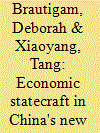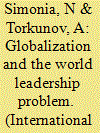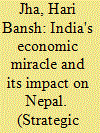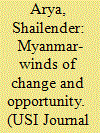|
|
|
Sort Order |
|
|
|
Items / Page
|
|
|
|
|
|
|
| Srl | Item |
| 1 |
ID:
116329


|
|
|
|
|
| Publication |
2012.
|
| Summary/Abstract |
Turkey's energy consumption is low compared to its young population. However, energy consumption is rapidly increasing as a result of economic growth in recent years, a trend which is expected to continue. Accordingly, guaranteeing adequate energy supply for its growing economy remains at the top of the governmental agenda. While energy consumption is increasing, Turkey is becoming increasingly dependent on fossil fuel imports, especially in oil and natural gas. Increasing awareness toward the environmental issues, energy prices and lack of diversification are the most immediate threats. All these are significant threats to Turkish energy security and thus have become a greater focus of attention. In response, Turkish energy policy is developing into a multi-dimensional one, considering the primary goals of securing energy supply and increasing the level of diversification and decreasing environmental effects. Accordingly, these considerations have tended to endorse renewable energy. Renewable energy resources are emerging as one of the most efficient, indigenous and effective solutions for clean and sustainable energy development in Turkey. Its geographical location allows extensive use of most types of renewable sources. This paper analyzes the current and possible future contribution of renewable energy in Turkish energy policy, considering supply security, diversification and environmental concerns.
|
|
|
|
|
|
|
|
|
|
|
|
|
|
|
|
| 2 |
ID:
113287


|
|
|
|
|
| Publication |
2012.
|
| Summary/Abstract |
China's rapidly growing economic engagement with other developing countries has aroused intense debates, but these debates have often generated more heat than light. The Chinese government is clearly pushing its companies to move offshore in greater numbers, and state-owned firms figure prominently in many of the major investments abroad. Yet relatively little research exists on when, how and why the Chinese government intervenes in the overseas economic activities of its firms. China's state-sponsored economic diplomacy in other developing countries could play three major strategic roles: strengthening resource security, enhancing political relationships and soft power, and boosting commercial opportunities for national firms. This article examines China's programme to establish overseas special economic zones as one tool of Beijing's economic statecraft. It traces the process by which they were established and implemented, and investigates the characteristics of the 19 zones initially selected in a competitive tender process. The article concludes that even in countries rich in natural resources, the overseas zones were overwhelmingly positioned as commercial projects. Particularly in the Asian zones, China is following in the footsteps of Japan. The zone programme, and the Chinese foreign investment it hoped to foster, represents a clear case of the international projection of China's developmental state. However, in Africa (but not generally elsewhere) discourse surrounding the zones publicly positions them as a transfer of China's own development success, thus potentially enhancing China's political relationships and soft power on the continent.
|
|
|
|
|
|
|
|
|
|
|
|
|
|
|
|
| 3 |
ID:
125012


|
|
|
|
|
| Publication |
2013.
|
| Summary/Abstract |
THE BIPOLAR SYSTEM of international relations tumbled down unexpectedly leaving behind at least two consequential factors which for a long time remained ignored and/or deliberately pushed aside by many international players. First, the world no longer needed any state with a status of superpower, a product of ideological confrontation of two systems (two camps, in the Cold War parlance). Second, the trend toward a multipolar world (which had appeared and had been developing for some time behind the screen of bipolarity) became obvious. Still gaining strength (the process will take more than one decade to be completed) it ran into a wall of skepticism. For a long time, skeptics of all hues refused to recognize the obvious and piled one argument on another in an effort to disprove what they called the concept of multipolarity. Truth be said, this is not a concept - this is reality which explains why the American idea of unipolarity picked up by its supporters in other countries (Russia among them) promptly went out of fashion. Revived bipolarity came into vogue together with the global crisis and expectations that China's rapidly growing economy which responded to the world crisis by a slight drop of GDP (from 10% to 7.58%) and its rapidly mounting military might will make it one of the poles instead of the Soviet Union. There is a lot of talk about a "new type of capitalism" that challenges the Western capitalist countries and that outstrips them one after another. Having pushed Japan from its second place in world economy China is pushing forward toward America's first place. The larger part of expert community, including experts of the UN and other international organizations, is convinced that this is merely a matter of time. This is another myth with no serious or solid scientific foundation: superficial and formal comparison of statistics (GDP or even per capita GDP) which implies that the world is uniform cannot be taken for the starting point.
|
|
|
|
|
|
|
|
|
|
|
|
|
|
|
|
| 4 |
ID:
109793


|
|
|
| 5 |
ID:
087059


|
|
|
|
|
| Publication |
London, Macmillan Company, 1971.
|
| Description |
xiii, 304p.
|
|
|
|
|
|
|
|
|
|
|
|
Copies: C:1/I:0,R:0,Q:0
Circulation
| Accession# | Call# | Current Location | Status | Policy | Location |
| 007358 | 332.46/FOL 007358 | Main | On Shelf | General | |
|
|
|
|
| 6 |
ID:
117211


|
|
|
|
|
|
|
|